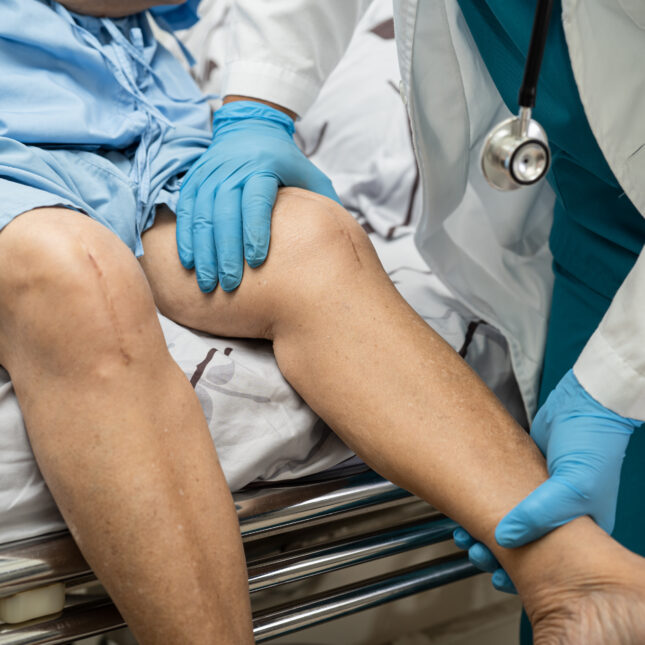Knee replacement surgery is one of the most effective treatments for people suffering from chronic knee pain due to arthritis, injury, or degenerative joint conditions. It can significantly improve mobility, reduce pain, and enhance the overall quality of life. Jaipur, with its top-notch medical facilities and experienced orthopedic surgeons, is becoming a popular destination for knee replacement surgery in India.
However, preparing for knee replacement surgery in Jaipur requires thorough planning and understanding of the process to ensure a smooth recovery. In this blog, we’ll explore essential tips on how to prepare for the surgery, what to expect, and how to ensure a successful outcome.
Understanding Knee Replacement Surgery
Knee replacement surgery, also known as knee arthroplasty, involves replacing the damaged or worn-out surfaces of the knee joint with artificial implants. The goal is to relieve pain, improve function, and enhance mobility. There are two main types of knee replacement surgeries:
- Total Knee Replacement (TKR): This procedure replaces the entire knee joint, involving both sides of the knee.
- Partial Knee Replacement (PKR): In this surgery, only a part of the knee joint is replaced. It is less invasive than TKR and generally has a faster recovery time.
Essential Tips to Prepare for Knee Replacement Surgery in Jaipur
1. Choose the Right Hospital and Surgeon
The success of knee replacement surgery largely depends on the expertise of the surgeon and the quality of care provided by the hospital. When selecting a hospital and surgeon in Jaipur, consider the following factors:
- Surgeon’s Experience: Research the credentials and experience of the orthopedic surgeons. Look for specialists who have successfully performed a significant number of knee replacement surgeries.
- Hospital Reputation: Ensure the hospital has a dedicated orthopedic department, state-of-the-art facilities, and positive patient reviews.
- Consultation: Schedule a consultation with your chosen surgeon to discuss your condition, treatment options, and expectations for the surgery.
Some of the top hospitals in Jaipur that offer knee replacement surgery include Sawai Man Singh (SMS) Hospital, Fortis Escorts Hospital, and Manipal Hospital.
2. Get a Complete Medical Evaluation
Before undergoing knee replacement surgery, a thorough medical evaluation is essential. This helps in assessing your overall health and ensuring that you’re physically ready for the procedure. The following tests are typically required:
- Blood Tests: These check for any underlying conditions that could affect surgery, such as anemia or infections.
- X-rays or MRI Scans: These images give a clear view of the extent of damage in your knee joint.
- Cardiac Evaluation: Patients with heart conditions may need a cardiovascular evaluation to ensure they are fit for surgery.
- Medication Review: Inform your doctor about any medications, supplements, or herbal remedies you’re taking. Some medications may need to be stopped before surgery to reduce the risk of complications.
3. Pre-Surgery Physical Conditioning
Building strength and flexibility in the muscles around your knee can significantly improve your recovery after surgery. Start a pre-surgery exercise routine under the guidance of a physical therapist. Focus on:
- Leg Strengthening Exercises: These can help support the knee joint and reduce strain after surgery.
- Stretching: Flexibility exercises will keep the muscles and tendons around the knee supple.
- Low-Impact Activities: Swimming or cycling are excellent for maintaining mobility without putting too much stress on the knees.
Your physical therapist may also teach you some exercises that you can perform immediately after surgery to accelerate the recovery process.
4. Plan for Post-Surgery Care
Recovery from knee replacement surgery takes time and requires a well-structured post-operative plan. Before undergoing the surgery, make sure you have everything in place to ensure a smooth recovery:
- Arrange Help at Home: For the first few weeks after surgery, you’ll need assistance with daily activities such as cooking, cleaning, and transportation.
- Set Up a Comfortable Space: Create a recovery area at home that is easily accessible, with essential items within reach (e.g., medications, water, and a phone). Ensure that there are no tripping hazards, such as loose rugs, that could cause falls.
- Home Modifications: Install handrails in the bathroom, shower, and stairs to make your home safer during the recovery period.
- Stock Up on Essentials: Purchase groceries, medications, and other necessities in advance so you won’t need to leave the house frequently after surgery.
5. Prepare for the Hospital Stay
Knowing what to expect during your hospital stay can reduce stress and anxiety. Most patients stay in the hospital for 3 to 5 days after knee replacement surgery. Here’s what to pack:
- Comfortable Clothing: Loose, comfortable clothing is essential, as you’ll need to wear garments that are easy to put on and take off.
- Medications: Bring any medications you regularly take, along with a list of these for your medical team.
- Mobility Aids: You may need crutches, a walker, or a cane to help you move around after the surgery. The hospital may provide these, but it’s helpful to have your own ready at home.
- Entertainment: Recovery can be tedious, so bring books, magazines, or electronic devices to keep yourself occupied.
6. Understand the Surgery and Recovery Process
Knowing the steps involved in knee replacement surgery can help you feel more prepared:
- Surgery Duration: The procedure usually lasts 1-2 hours, depending on whether it’s a total or partial knee replacement.
- Anesthesia: General anesthesia or spinal anesthesia will be administered to numb the area and ensure you remain pain-free during the procedure.
- Post-Surgery Recovery: After the surgery, you’ll spend some time in the recovery room before being transferred to your hospital room. Your healthcare team will monitor your condition, and pain management medications will be provided to ensure your comfort.
- Physiotherapy: Physical therapy usually begins within 24 hours of surgery. Your therapist will guide you through gentle exercises to improve mobility and strengthen the knee joint.
7. Plan for Rehabilitation
Rehabilitation is crucial for a successful recovery after knee replacement surgery. Following your hospital discharge, you will need to continue with physiotherapy and other rehabilitation activities at home or in a rehab center.
- Physiotherapy Sessions: You’ll likely need to attend physiotherapy sessions 2-3 times per week for several weeks. These sessions focus on improving range of motion, strength, and balance.
- Home Exercises: Your physical therapist will prescribe a set of exercises that you should perform at home daily to speed up your recovery.
- Follow-Up Appointments: Regular follow-up visits with your surgeon are essential to monitor your progress and address any concerns.
Conclusion
Preparing for knee replacement surgery in Jaipur requires careful planning and a proactive approach to ensure the best possible outcome. From selecting the right surgeon and hospital to understanding the surgery process and planning for recovery, each step is crucial for a smooth experience.
By following these essential tips, you can take control of your health, minimize complications, and improve your chances of a successful recovery. Knee replacement surgery can be life-changing, offering long-term relief from chronic pain and enabling you to enjoy an active lifestyle once again.
- Leading CA Firm in Chandigarh for Corporate and Individual Services - February 3, 2026
- IVF Specialist in Panchkula – Advanced Fertility Care with High Success Rates - February 3, 2026
- Best Chest Specialist in Chandigarh for Personalized Chest and Lung Care - January 29, 2026




